Medical Appointment Letter Sample
Dear [Patient Name],
I am writing to confirm your upcoming medical appointment on [Date] at [Time] with [Doctor Name] at [Clinic/Hospital Name]. We are pleased that you have chosen us for your healthcare needs and are committed to providing you with the best possible care.
Please arrive 15 minutes prior to your scheduled appointment time to complete any necessary paperwork and to ensure that your appointment can begin on time. During your appointment, Dr. [Doctor Name] will review your medical history, perform a physical examination, and discuss any concerns or questions you may have.
If you need to reschedule or cancel your appointment, please notify us at least 24 hours in advance so that we may accommodate other patients who need medical attention. Failure to provide advance notice may result in a missed appointment fee.
Please bring the following items with you to your appointment:
- Your insurance card and a form of identification
- A list of current medications, including any over-the-counter or herbal supplements
- Any relevant medical records or test results from other healthcare providers
- Any copay or deductible amounts as required by your insurance plan
If you have any questions or concerns before your appointment, please do not hesitate to contact us at [Clinic/Hospital Phone Number]. We look forward to seeing you on [Date] and providing you with exceptional medical care.
Sincerely,
[Your Name]
[Clinic/Hospital Name]
Medical Job Appointment Letter Sample
Dear [Candidate Name],
We are pleased to offer you the position of [Medical Job Title] at [Clinic/Hospital Name]. Your experience and qualifications make you an excellent fit for our team, and we are confident that you will make valuable contributions to our organization.
Your start date will be [Date], and you will report to [Supervisor Name]. Your starting salary will be [Salary], and you will be eligible for [Benefits]. As a member of our team, you will be required to work [Hours/Week] and comply with all relevant policies and procedures.
Please review the attached job description and sign the enclosed copy of this letter to indicate your acceptance of the position. You will also need to provide the following documentation before your start date:
- Proof of eligibility to work in the United States
- Your current resume and contact information for three professional references
- Copies of all relevant licenses and certifications
- Your educational transcripts and diplomas
In addition, you will be required to complete a pre-employment drug screening and background check. These screenings must be completed before your start date, and any negative results may result in the revocation of this job offer.
We look forward to welcoming you to our team and are confident that you will make valuable contributions to our organization. If you have any questions or concerns, please do not hesitate to contact us.
Sincerely,
[Your Name]
[Title]
[Clinic/Hospital Name]
Request for Medical Appointment
Subject: Request for Medical Appointment
Dear [Doctor's Name/Clinic Name],
I am writing to request an appointment with you at your earliest convenience. I have been experiencing [briefly describe symptoms or health concern] and would appreciate your professional evaluation and guidance.
I am available on [list specific days and times], but I am happy to work around your schedule if these times are not suitable. Please let me know what dates and times are available for an appointment.
If you require any medical records or information prior to the appointment, please inform me and I will ensure these are provided promptly.
Thank you for your attention to this matter. I look forward to hearing from you soon.
Sincerely,
[Your Name]
[Your Contact Information]
Confirmation of Medical Appointment
Subject: Confirmation of Appointment on [Date]
Dear [Patient Name],
This email confirms your appointment scheduled for [Date] at [Time] with [Doctor's Name] at [Clinic/Hospital Name], located at [Address].
Please arrive 15 minutes early to complete any necessary paperwork. Remember to bring:
- Your insurance card
- Photo identification
- List of current medications
- Any relevant medical records
If you need to reschedule or cancel, please contact us at least 24 hours in advance at [Phone Number].
We look forward to seeing you.
Best regards,
[Clinic Name]
[Contact Information]
Medical Appointment Cancellation Letter
Subject: Cancellation of Appointment on [Date]
Dear [Doctor's Name/Clinic Name],
I regret to inform you that I must cancel my scheduled appointment on [Date] at [Time] due to [brief reason: unforeseen circumstances/conflict/illness/etc.].
I apologize for any inconvenience this may cause. I would like to reschedule at your earliest availability. Please let me know what dates and times would work for a new appointment.
Thank you for your understanding.
Sincerely,
[Your Name]
[Your Contact Information]
Medical Appointment Rescheduling Request
Subject: Request to Reschedule Appointment
Dear [Clinic Name],
I am currently scheduled for an appointment on [Original Date] at [Original Time], but I am unable to attend due to [reason: work commitment/travel/personal emergency].
Could we please reschedule to one of the following alternative times:
- [Date and Time Option 1]
- [Date and Time Option 2]
- [Date and Time Option 3]
If none of these work, I am flexible and can adjust to your available slots. I apologize for any inconvenience and appreciate your assistance in finding a new time.
Thank you,
[Your Name]
[Phone Number]
Medical Appointment Reminder to Patient
Subject: Reminder: Upcoming Appointment on [Date]
Hi [Patient Name],
This is a friendly reminder about your upcoming appointment:
Date: [Date]
Time: [Time]
Doctor: [Doctor's Name]
Location: [Clinic Address]
Please remember to bring your insurance information and arrive 10 minutes early. If you need to cancel or reschedule, please call us at [Phone Number] as soon as possible.
Looking forward to seeing you!
[Clinic Name]
[Contact Details]
Medical Appointment Letter for Employer (Work Excuse)
Subject: Medical Appointment Notification
Dear [Supervisor's Name],
I am writing to inform you that I have a medical appointment scheduled for [Date] at [Time]. I will need to be absent from work from [Start Time] to [End Time], approximately [number] hours.
I have arranged for [colleague's name] to cover my responsibilities during my absence, and I will ensure all urgent tasks are completed beforehand. If possible, I will make up the time by [working late/coming in early/using personal leave].
Please let me know if you need any additional information or documentation.
Thank you for your understanding.
Best regards,
[Your Name]
Medical Appointment Verification Letter from Doctor
Subject: Verification of Medical Appointment
To Whom It May Concern,
This letter confirms that [Patient Name] had a medical appointment at our facility on [Date] at [Time]. The appointment lasted approximately [duration].
The patient was seen by [Doctor's Name] for [general reason without specific diagnosis, e.g., "routine consultation" or "medical evaluation"].
If you require any additional information, please contact our office at [Phone Number].
Sincerely,
[Doctor's Name]
[Medical License Number]
[Clinic Name]
[Clinic Address]
[Date]
Urgent Medical Appointment Request
Subject: URGENT: Request for Emergency Appointment
Dear [Doctor's Name],
I am writing to request an urgent appointment due to [describe acute symptoms or medical concern]. This issue has developed [suddenly/over the past few days] and is causing significant [pain/discomfort/concern].
Given the urgent nature of this situation, I would greatly appreciate if you could see me as soon as possible, even if it means fitting me in between other appointments. I am available at any time that works for your schedule.
If you are unable to accommodate an emergency appointment, please advise if I should seek care at an urgent care facility or emergency room.
Thank you for your prompt attention to this matter.
[Your Name]
[Contact Number]
Medical Appointment Request for Dependent (Child/Elderly Parent)
Subject: Appointment Request for [Dependent's Name]
Dear [Doctor's Name],
I am writing to schedule an appointment for [relationship: my child/my parent/my spouse], [Dependent's Name], who is under my care. [He/She/They] has been experiencing [symptoms or concern] and requires medical attention.
[Dependent's Name] is [age] years old and [any relevant medical history]. I am available to bring [him/her/them] on the following dates and times: [list availability].
Please let me know what appointment times are available. I will be accompanying [him/her/them] to the appointment and can provide any additional information you may need.
Thank you for your assistance.
Regards,
[Your Name]
[Relationship to Patient]
[Contact Information]
Follow-Up Medical Appointment Request
Subject: Request for Follow-Up Appointment
Dear [Doctor's Name],
Following my recent appointment with you on [Date], you recommended that I schedule a follow-up visit in [timeframe]. I am writing to arrange this appointment.
Since our last meeting, [describe any changes in condition, medication effects, or new symptoms]. I would like to discuss [specific concerns or topics for follow-up].
I am available [list your availability]. Please let me know what times work best for your schedule.
Thank you for your continued care.
Best regards,
[Your Name]
[Patient ID if applicable]
[Contact Information]
What is a Medical Appointment Letter and Why Do You Need It
A medical appointment letter is a formal or informal written communication that serves various purposes related to healthcare visits. These letters can be sent by patients to request, confirm, cancel, or reschedule appointments, or by healthcare providers to confirm appointments, send reminders, or verify that a patient attended a medical visit.
The primary purposes include:
- Documenting the appointment for both patient and provider records
- Providing proof of medical visits for employers, schools, or legal purposes
- Ensuring clear communication about dates, times, and expectations
- Reducing no-shows through reminder letters
- Maintaining professionalism in healthcare interactions
- Creating a paper trail for insurance and billing purposes
When Do You Need a Medical Appointment Letter
Medical appointment letters are needed in various situations:
- When requesting a new appointment with a healthcare provider you haven't seen before
- When needing to inform your employer about time off for medical reasons
- When confirming appointment details after scheduling by phone
- When canceling or rescheduling due to conflicts or emergencies
- When requesting urgent or emergency appointments for acute health issues
- After missing an appointment and needing to reschedule
- When scheduling for dependents such as children or elderly parents
- When following up after a previous appointment as recommended by your doctor
- When you need documentation for work, school, insurance, or legal matters
- When providers send reminders to reduce patient no-shows
- When verification is required by third parties about your attendance
Who Should Send Medical Appointment Letters
The sender varies depending on the purpose:
- Patients requesting, canceling, or rescheduling their own appointments
- Parents or guardians scheduling appointments for minors or dependents
- Caregivers arranging medical visits for those under their care
- Medical office staff sending confirmations, reminders, or follow-up requests
- Healthcare providers or physicians verifying attendance or providing documentation
- Human resources personnel requesting verification for workplace policies
- Legal representatives when medical documentation is required for cases
- Patient advocates helping individuals navigate healthcare systems
To Whom Should Medical Appointment Letters Be Addressed
The recipient depends on the letter's purpose:
- Healthcare providers (doctors, specialists, therapists) when requesting appointments
- Medical clinic staff or receptionists who manage scheduling
- Patients when providers send confirmations or reminders
- Employers or supervisors when notifying about medical leave
- Human resources departments for formal work excuse documentation
- School administrators when students miss class for medical reasons
- Insurance companies when proof of appointment is required for claims
- Legal representatives when medical attendance verification is needed for court cases
- Government agencies for disability or benefits applications
How to Write and Send a Medical Appointment Letter
Writing an effective medical appointment letter involves several steps:
Planning Phase:
- Determine the purpose (request, cancel, reschedule, verify)
- Gather necessary information (dates, times, patient details, insurance information)
- Identify the appropriate recipient and their contact information
- Check if there's a preferred method of communication (email, portal, mail, fax)
Writing Process:
- Start with a clear subject line that states the purpose
- Use an appropriate greeting based on formality level
- State your purpose in the first paragraph
- Include all relevant details (dates, times, patient name, reason if necessary)
- Provide alternative options when requesting or rescheduling
- Express appreciation for accommodation or understanding
- Close professionally with your contact information
Sending Methods:
- Email for quick, documented communication (most common today)
- Patient portals if your healthcare provider uses an online system
- Phone call followed by written confirmation for urgent matters
- Postal mail for formal verification letters or official documentation
- Fax in some traditional medical offices
Requirements and Prerequisites Before Writing the Letter
Before composing your medical appointment letter, ensure you have:
- Patient identification information (full name, date of birth, patient ID number)
- Insurance details if this is a new appointment
- Current contact information (phone number, email, mailing address)
- Medical history summary if requesting a new patient appointment
- Referring physician information if seeing a specialist
- Specific symptoms or concerns to describe your medical need
- Appointment reference number if canceling or rescheduling
- Original appointment details (date, time, provider) when making changes
- Your availability with multiple date/time options for scheduling
- Employer's requirements if the letter is for work documentation
- Insurance pre-authorization if required for specialist visits
- List of current medications for new patient appointments
Formatting Guidelines for Medical Appointment Letters
Proper formatting ensures your letter is professional and effective:
Length:
- Keep letters brief and concise (3-5 paragraphs maximum)
- Verification letters from doctors can be shorter (2-3 paragraphs)
- Include only essential information
Tone:
- Use a professional tone for new patient requests and work documentation
- Courteous and apologetic when canceling or rescheduling
- Urgent but polite for emergency appointment requests
- Friendly but professional for routine communications
Structure:
- Clear subject line indicating purpose
- Appropriate greeting (Dear Dr./Clinic Name)
- Concise opening stating purpose
- Middle paragraph with details
- Closing with gratitude and contact information
- Professional signature
Style:
- Use formal business letter format for employer documentation
- Email format acceptable for routine scheduling matters
- Bullet points for lists (availability, items to bring)
- Avoid medical jargon unless writing to healthcare professionals
- Proofread for errors before sending
What to Do After Sending Your Medical Appointment Letter
After sending your letter, take these follow-up actions:
Immediate Actions:
- Save a copy of the letter for your records
- Note the date and time you sent the communication
- Mark your calendar with any provisional dates mentioned
Within 24-48 Hours:
- Check for confirmation via email or phone
- Follow up with a phone call if you don't receive a response for urgent requests
- Verify receipt if the matter is time-sensitive
For Appointment Requests:
- Wait for confirmation before assuming the appointment is scheduled
- Add confirmed appointments to your calendar immediately
- Set reminders 24 hours before the appointment
For Cancellations:
- Ensure you receive acknowledgment that the appointment has been canceled
- Request confirmation of any rescheduled appointment
- Check your calendar to ensure no conflicts remain
For Work Documentation:
- Provide copy to HR as required by company policy
- Keep original for your personal records
- Follow up to ensure it was received and filed properly
If No Response:
- Call the office directly after 2-3 business days
- Send a follow-up email or message
- Visit in person if it's a local provider and the matter is urgent
Common Mistakes to Avoid with Medical Appointment Letters
Avoid these frequent errors that can cause confusion or delays:
- Being vague about dates and times - Always include specific information
- Forgetting to include contact information - Providers need to reach you
- Not checking office hours or policies before sending cancellation notices
- Waiting until the last minute to cancel or reschedule
- Providing too much medical detail in letters to employers (HIPAA concerns)
- Using informal language in professional or work-related letters
- Forgetting to mention urgency when requesting emergency appointments
- Not offering alternative dates when requesting appointments
- Sending to the wrong department or provider
- Omitting patient identification information causing confusion with records
- Writing overly long explanations that obscure the main purpose
- Not proofreading leading to unclear or unprofessional communication
- Failing to follow up when you don't receive a response
- Assuming email was received without confirmation
- Including irrelevant personal information that distracts from the purpose
Essential Elements and Structure of Medical Appointment Letters
Every effective medical appointment letter should include:
Opening Elements:
- Clear, descriptive subject line
- Appropriate salutation (Dear Dr. Smith, Dear Clinic Staff)
- Brief introduction identifying yourself and purpose
Body Elements:
- Patient identification (name, date of birth, patient ID if known)
- Specific dates and times relevant to your request
- Reason for appointment (general description, not detailed diagnosis)
- Alternative options when requesting scheduling flexibility
- Current situation if rescheduling or canceling
- Availability with multiple date/time options
Closing Elements:
- Expression of gratitude or appreciation
- Clear call to action (please confirm, please contact me)
- Your complete contact information
- Professional closing (Sincerely, Best regards)
- Your signature (typed name for emails)
Optional Attachments:
- Medical records (for new patients)
- Insurance information
- Referral letters (for specialists)
- Previous test results if relevant
Comparing Medical Appointment Letters with Alternative Communication Methods
Understanding different options helps you choose the most effective approach:
Medical Appointment Letter vs. Phone Call:
- Letters provide written documentation while calls are verbal
- Calls allow immediate scheduling but letters create a paper trail
- Letters can be sent outside office hours; calls require office availability
- Calls enable quick clarification of questions
- Use letters when documentation is needed; use calls for urgent matters
Medical Appointment Letter vs. Online Portal:
- Portals offer instant confirmation and automated reminders
- Letters may be required for formal documentation to third parties
- Portals integrate with medical records automatically
- Letters provide more detailed explanations when needed
- Portals are faster; letters are more formal
Patient-Initiated vs. Provider-Initiated Letters:
- Patient letters request action; provider letters confirm or remind
- Provider letters are often standardized; patient letters are personalized
- Patient letters may require follow-up; provider letters are informational
- Provider letters have legal/liability considerations
Email vs. Physical Letter:
- Emails are faster and create automatic timestamp records
- Physical letters are more formal and traditional
- Emails risk being overlooked in spam folders
- Physical letters take longer but feel more official for work documentation
Tips and Best Practices for Medical Appointment Letters
Maximize effectiveness with these proven strategies:
- Be specific with timing - Include date, time, and even time zone if relevant
- Offer multiple alternatives when requesting appointments (increases scheduling success)
- Keep it brief - Busy medical staff appreciate concise communication
- Use "urgent" sparingly - Reserve it for genuinely time-sensitive matters
- Reference previous conversations - "As we discussed on the phone..."
- Include patient ID numbers - Helps staff locate your records quickly
- Send during business hours when possible for faster response
- Use the provider's preferred communication method (check their website)
- Be courteous when canceling - Medical practices appreciate respect for their time
- State your flexibility - "I can adjust my schedule to accommodate your availability"
- Proofread carefully - Errors undermine professionalism
- Save confirmation numbers - Track all correspondence
- Set calendar alerts - Remind yourself 24 hours and 1 hour before appointments
- Keep templates handy - Save time for future correspondence
- Double-check recipient - Ensure you're contacting the correct office or department
Advantages and Disadvantages of Medical Appointment Letters
Advantages:
- Creates permanent written record of all communications
- Allows you to clearly articulate complex scheduling needs
- Can be sent anytime, not limited to office hours
- Provides documentation for employers, insurance, or legal needs
- Reduces miscommunication about dates, times, and details
- Shows professionalism and respect for the provider's time
- Enables thoughtful composition rather than rushed phone conversations
- Can be easily forwarded to relevant parties
Disadvantages:
- Slower response time compared to phone calls
- Risk of emails being overlooked or filtered to spam
- No immediate confirmation that message was received
- May require follow-up to ensure action was taken
- Cannot ask clarifying questions in real-time
- Some offices prefer phone calls for scheduling
- Lack of personal connection compared to verbal communication
- Potential for misinterpretation without tone of voice
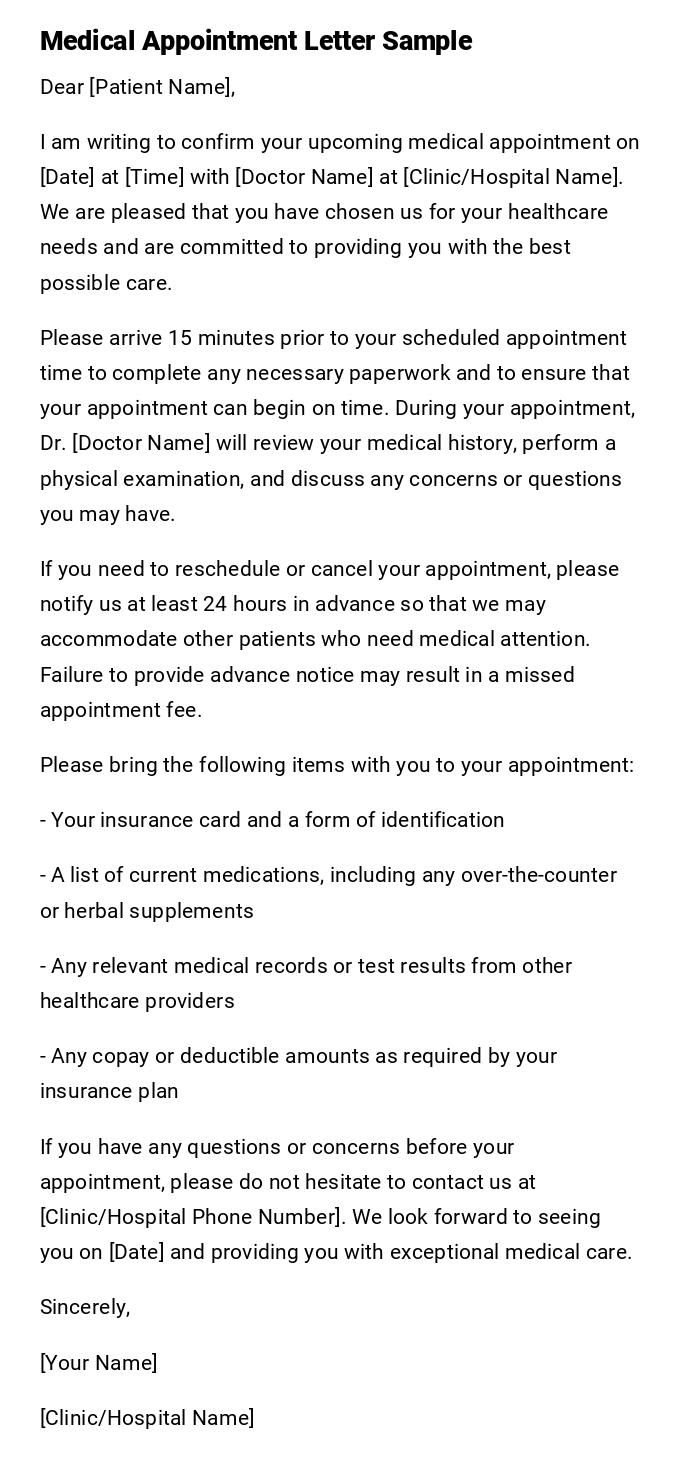
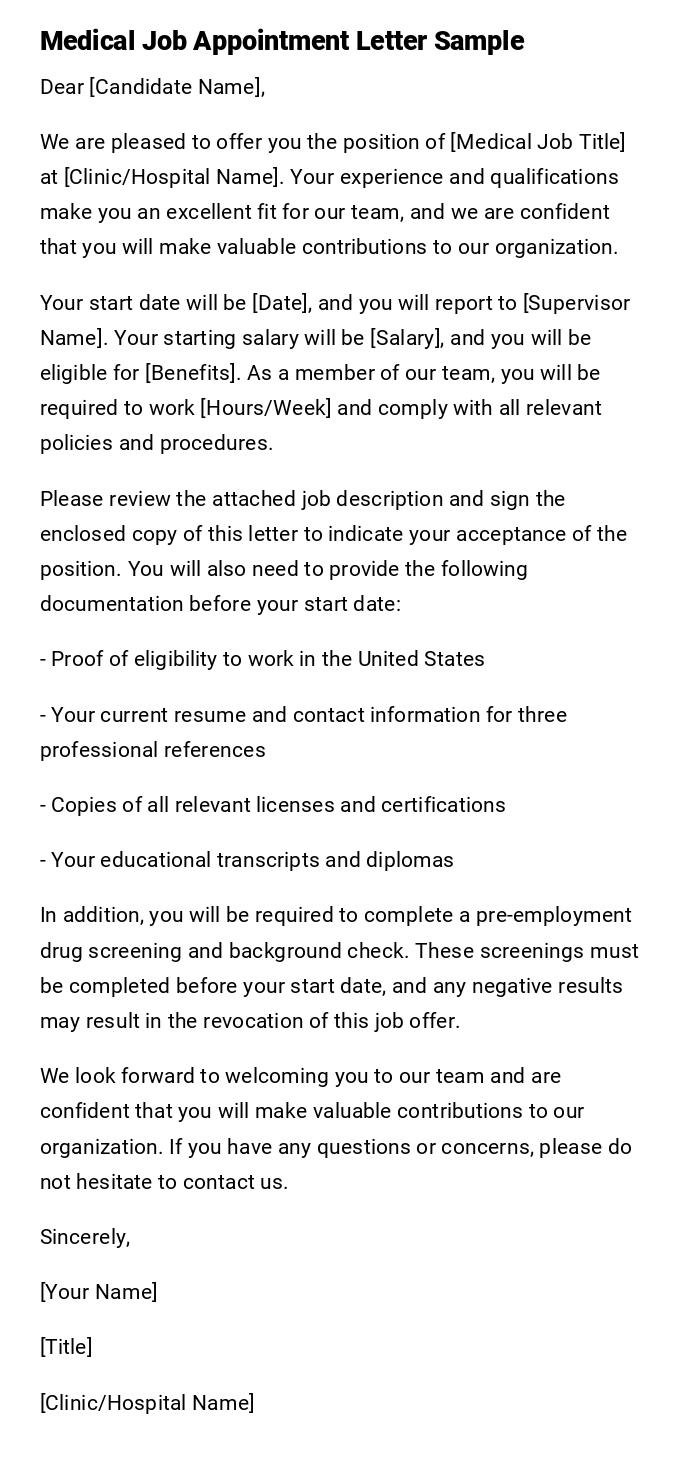
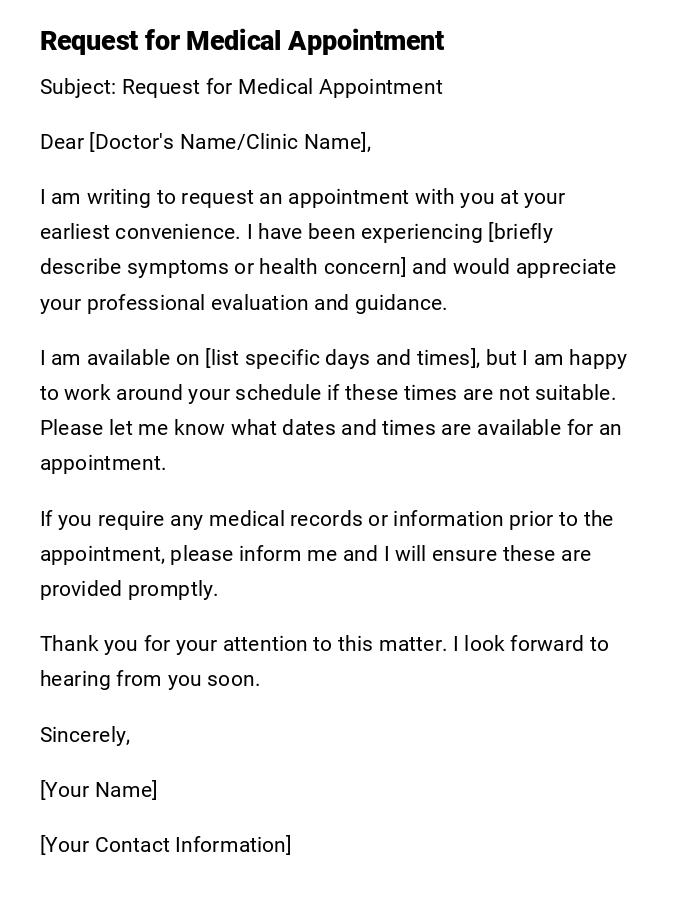
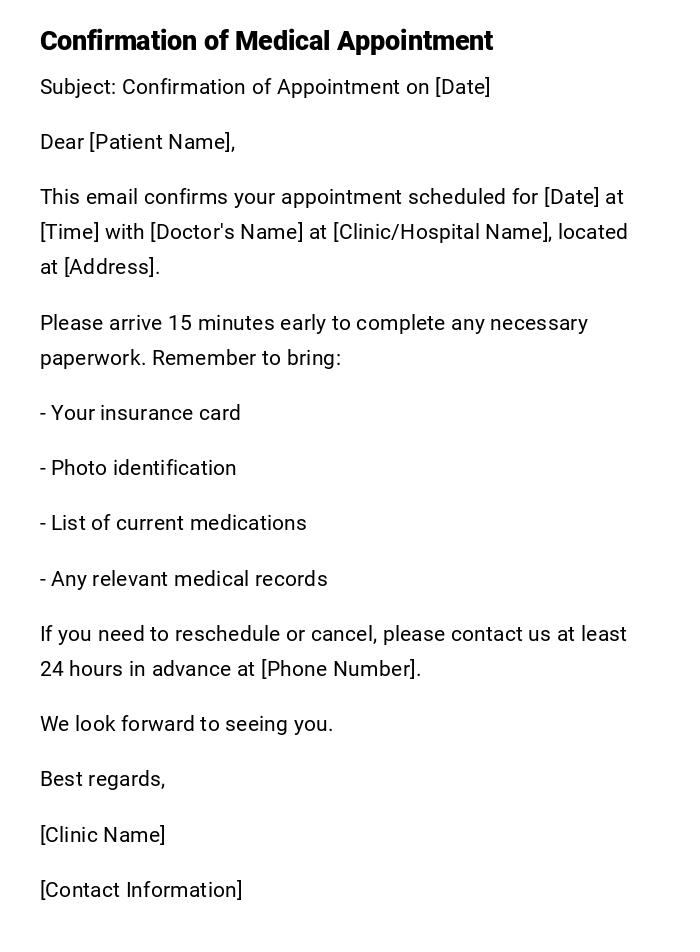
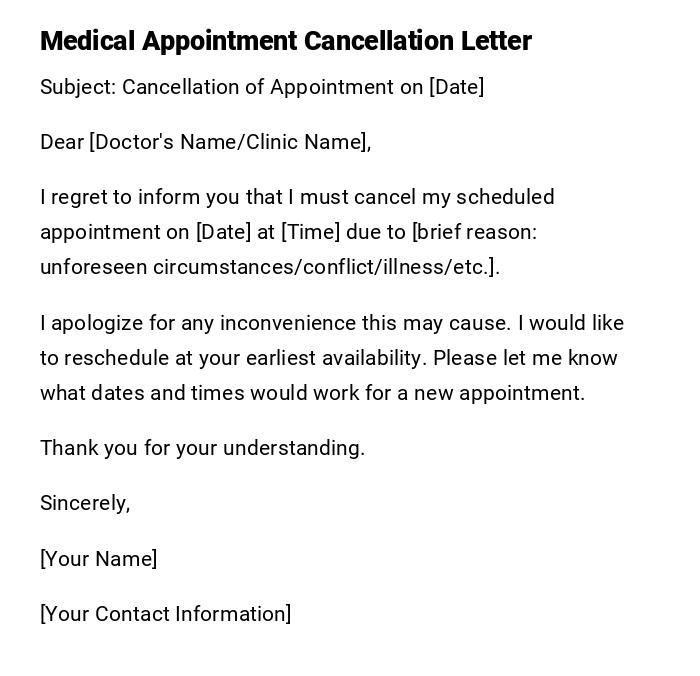
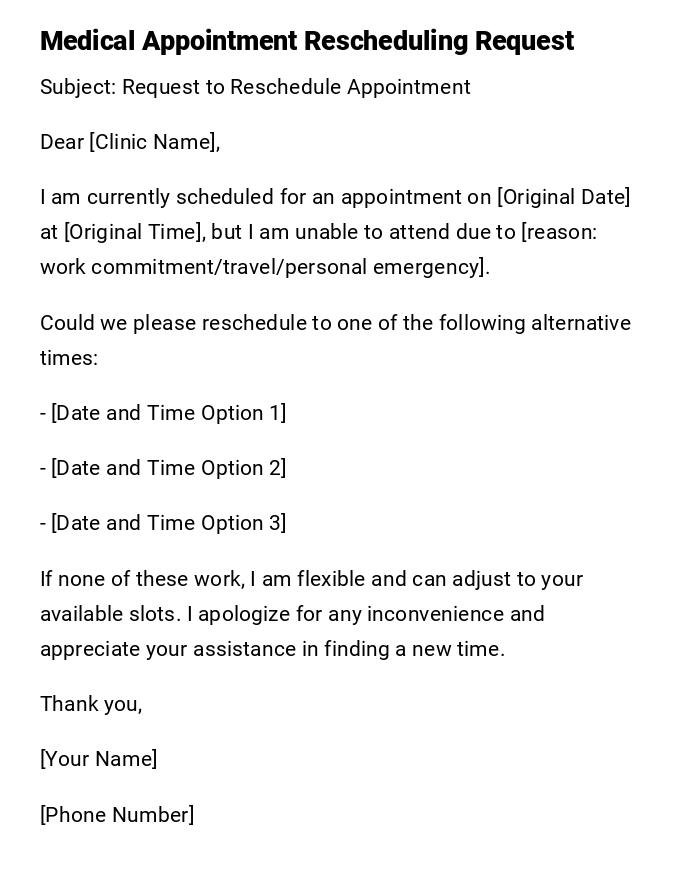
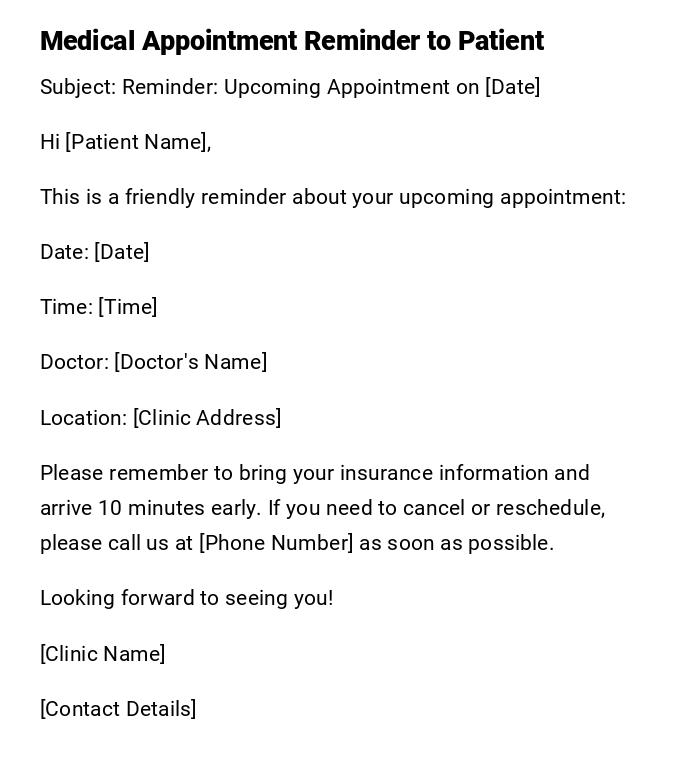
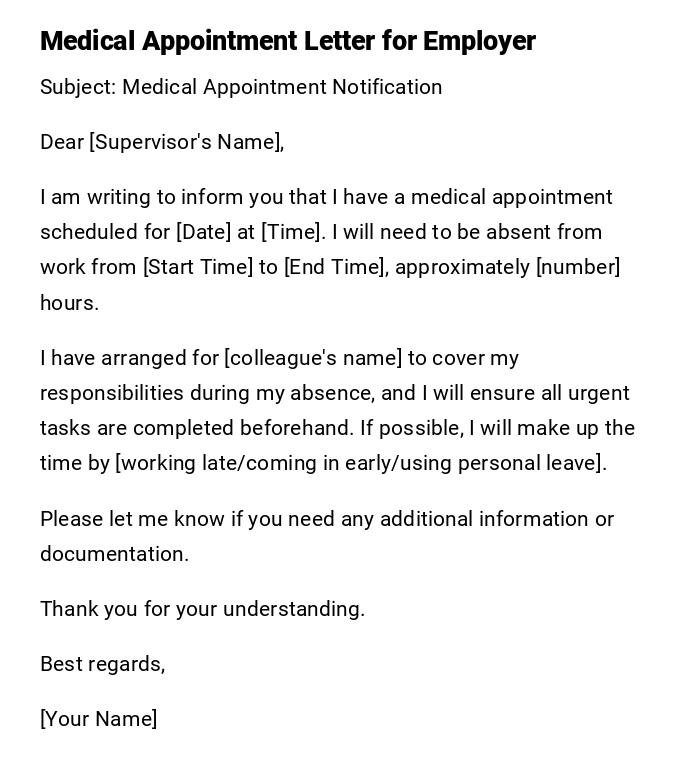
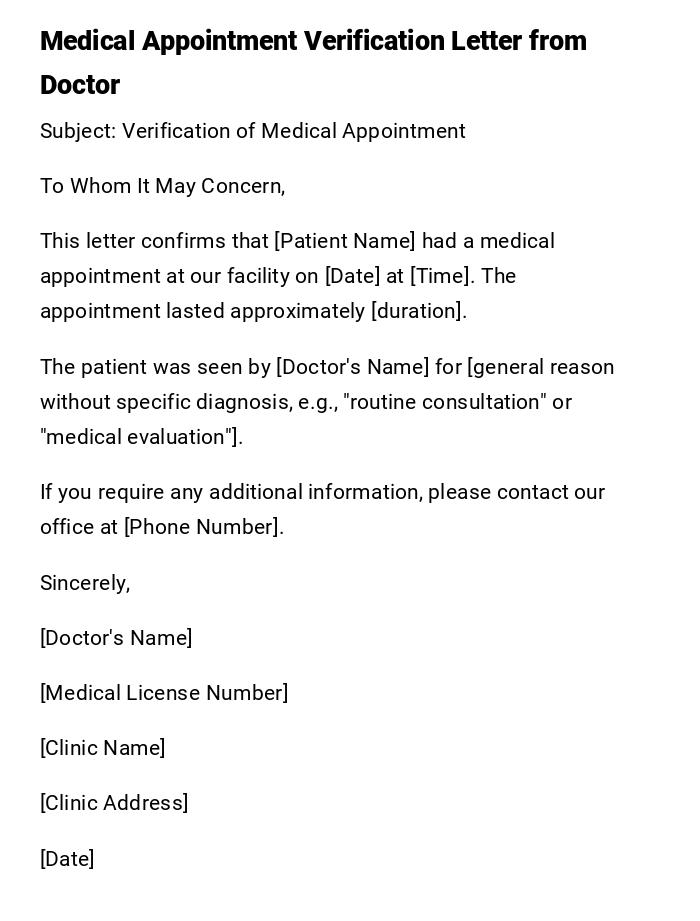
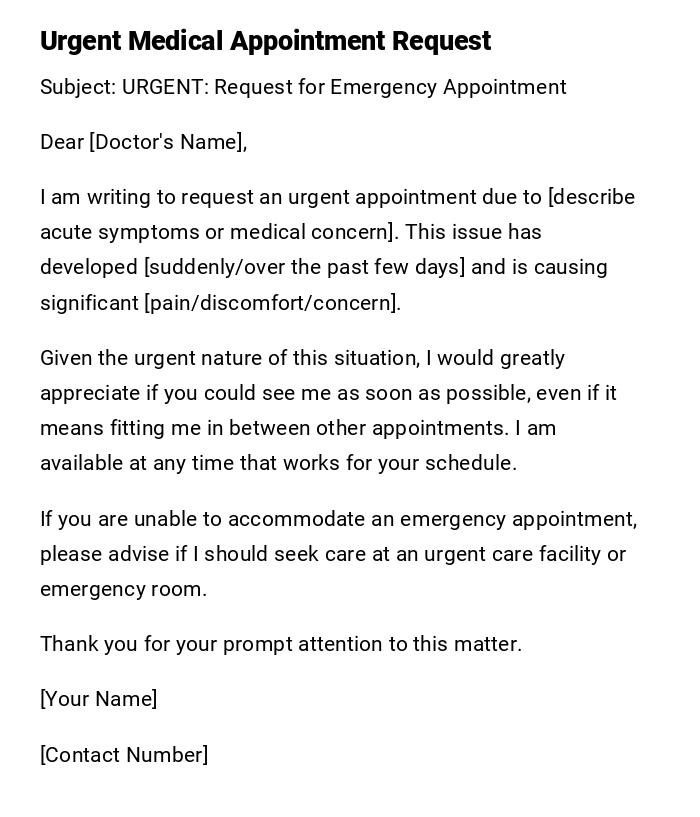
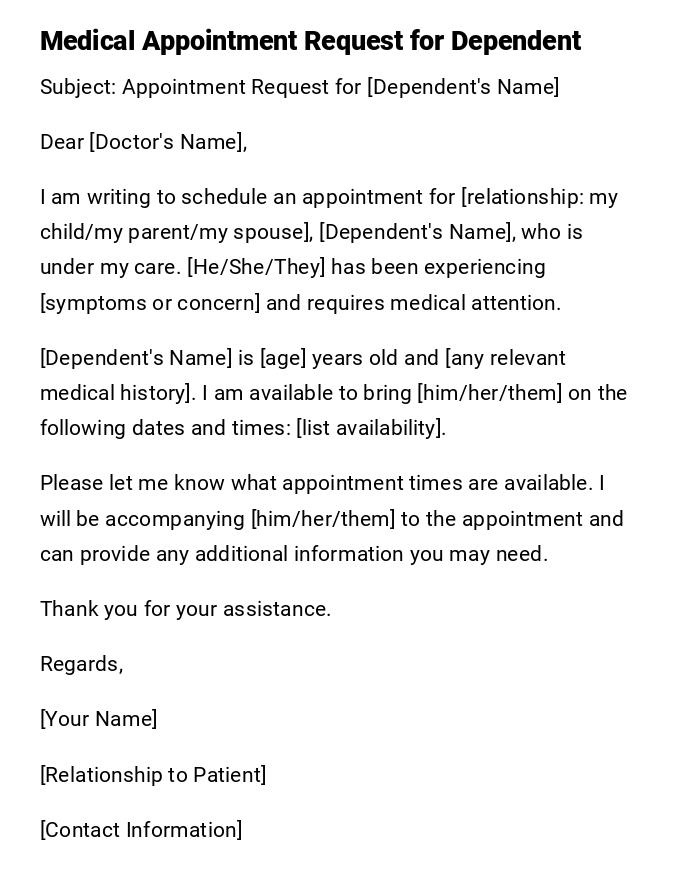
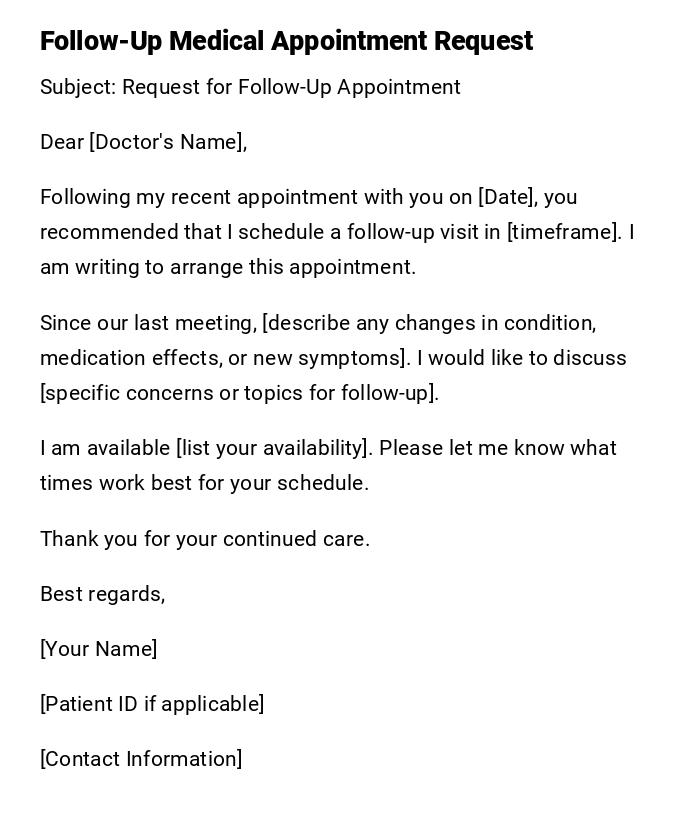

 Download Word Doc
Download Word Doc
 Download PDF
Download PDF